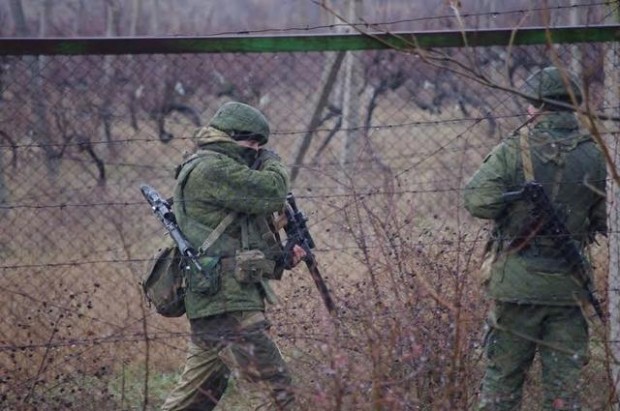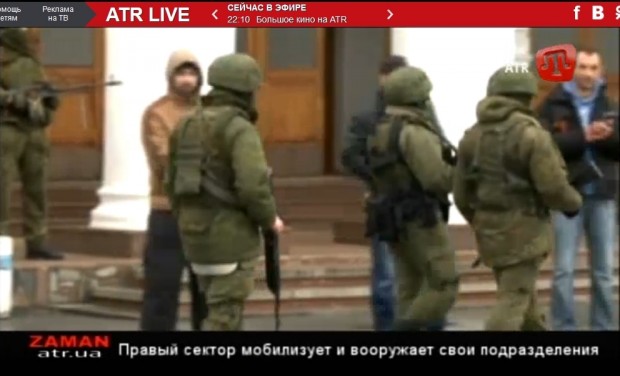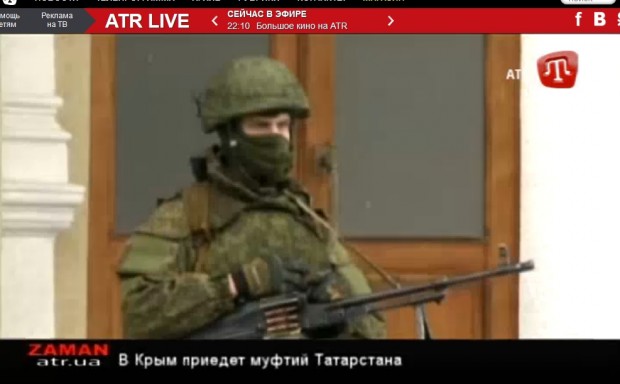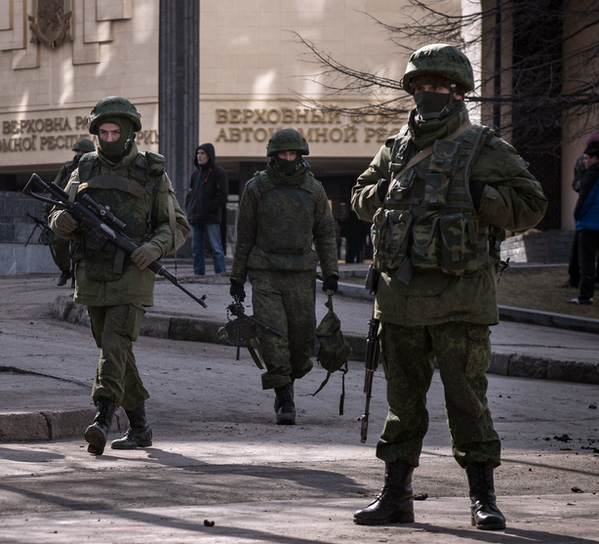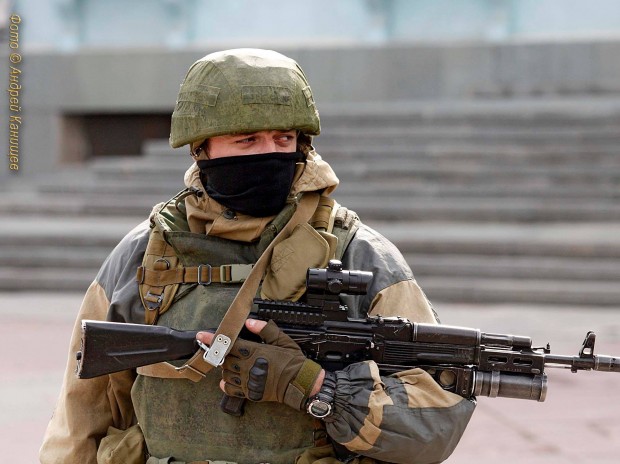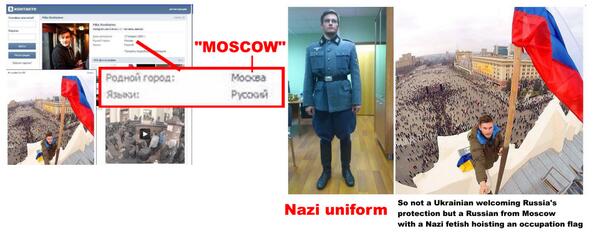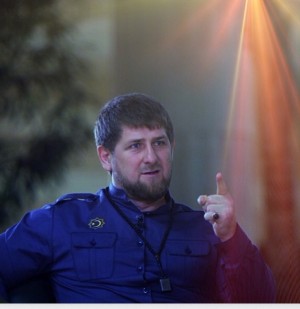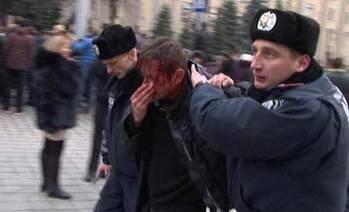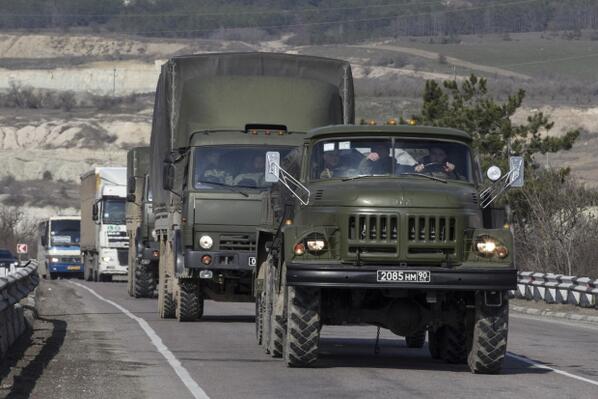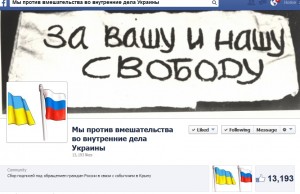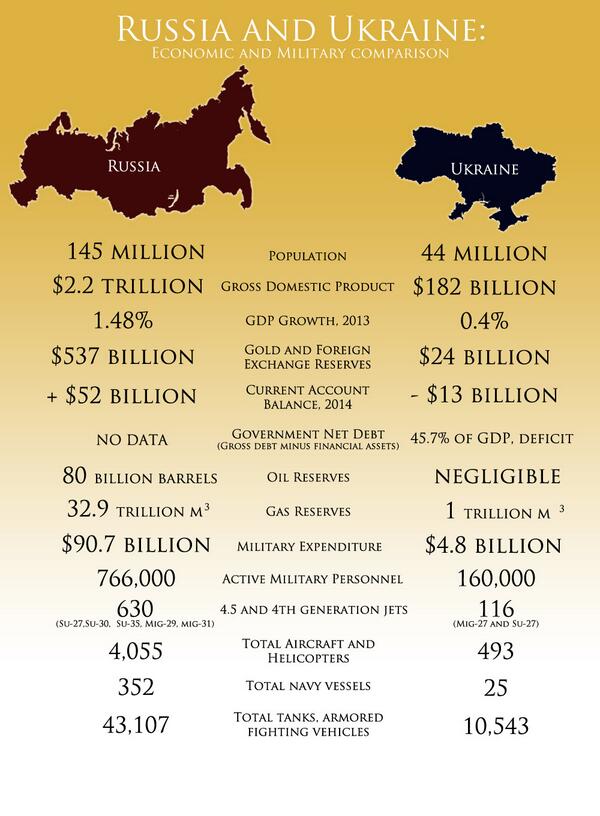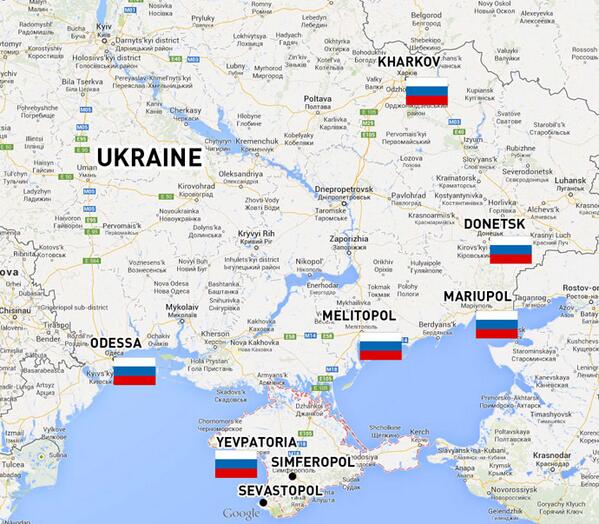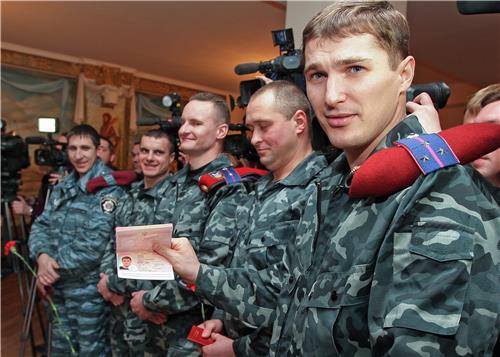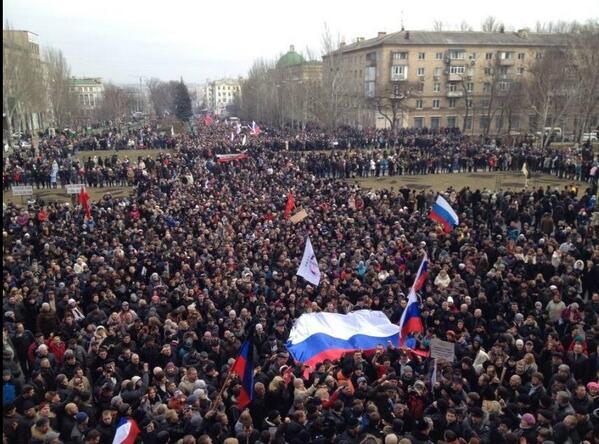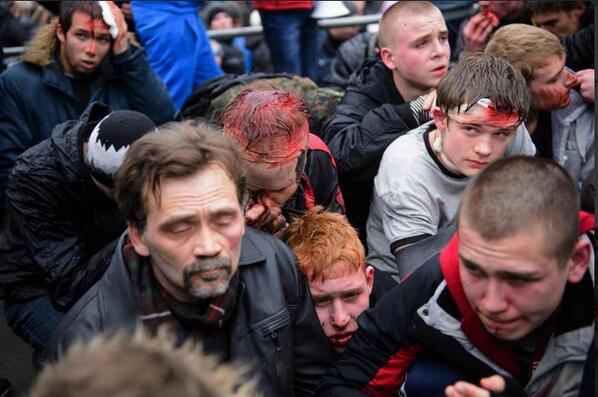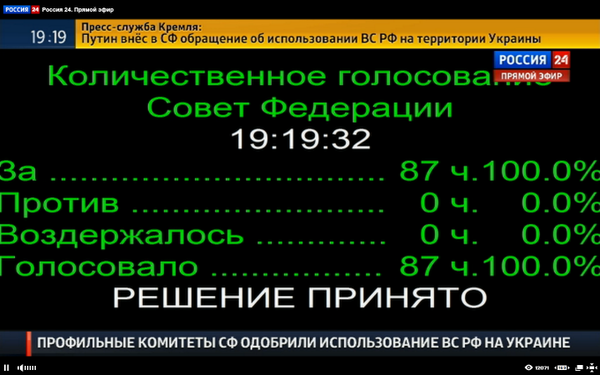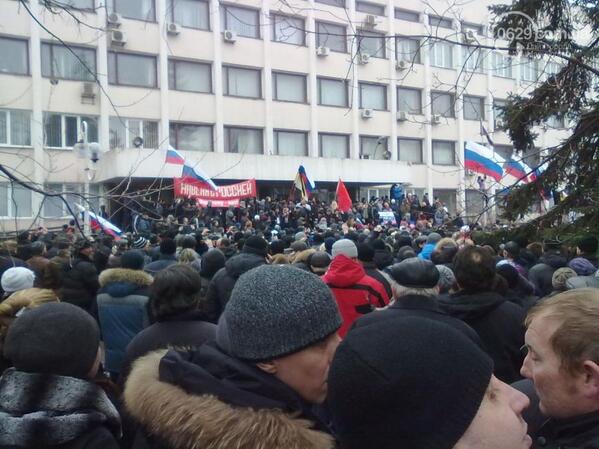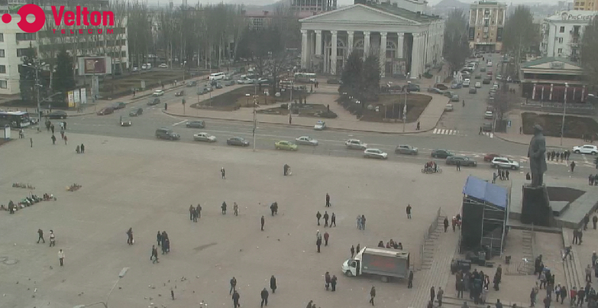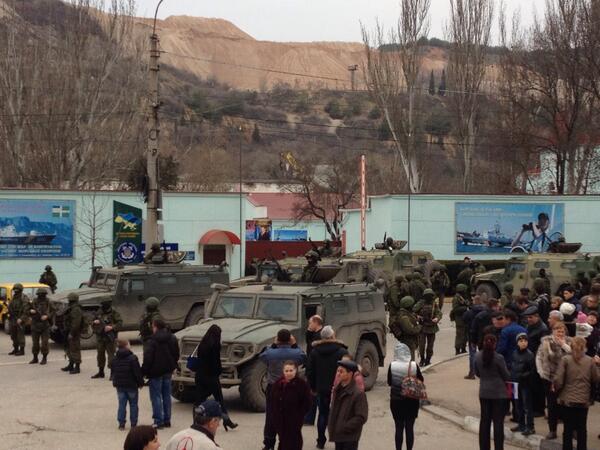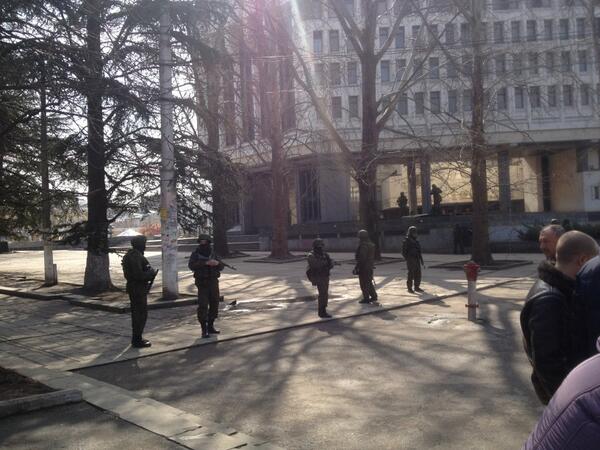Amid reports of more Russian troops in Ukraine, Russian President Vladimir Putin has proposed sending a stabilization force into the country until it is “normalized.” This is an invasion, just under a different name.
Yesterday’s liveblog can be found here. For an overview and analysis of this developing story see see our latest podcast.
Below, we will be making regular updates throughout the day:
0944 GMT:
More information has come in about the background to the violence in Kharkhiv from veteran Russian human rights activist Alexey Korotaev who is on the scene:
“For several days, the Kharkhiv EuroMaidan supporters had staged a picket in front of the regional administration building on the city’s largest square. Young men and women (some very young) occupied the steps and the foyer of the building and vowed not to let Mikhail Dobkin, the Kharkhiv Region governor into the building, seeking his resignation. (Dobkin is one of the more prominent figures in the Party of Regions who had declared his separation from Kiev; in fact he resigned 26 February after announcing he would run for president, but the protesters kept up their picket.)
In the center of the square is a large statue of Lenin, where an anti-Maidan group then set up a camp to prevent the monument from being torn down. There were only a few dozen of them for several days and nights, until suddenly on the morning of 1 March, their ranks were swelled by thousands of people, many armed with baseball bats and metal prongs. These men stormed the building while the police essentially stood aside. This crowd dragged the EuroMaidan supporters out of the building and beat them, then looted and vandalized the building, which up to that point had not been touched.”
Korotaev added that Ukrainian ultranationalists from Right Sector did not appear to be present, but eye-witnesses reported buses arriving from the Russian cities of Belgorod, Voronezh and Kursk with Russian nationalists. Espreso TV reported that some 2,000 nationalist activists were bussed in from Belgorod Region for the riot, then returned home. Some observers have speculated that the Mayor Hennadiy Kernes may have also instigated his supporters in a bid to show the new authorities in Kiev, who have been busy removing corrupt officials associated with the Yanukovych regime, that he could incite a mob to call for joining Russia if he were removed from power.
In the evening, Mayor Kernes told Interfax Ukraine, “I take upon myself personal responsibility to preserve order here, so that there will be no calls for separatism.”
Korotaev commented about Kharkhiv, a former Soviet science hub now suffering high unemployment, “For anti-Maidan residents of Kharkhiv, especially the middle-aged and elderly, this is not about their wish to join Russia, it’s about their dream to return to the USSR. It’s also important to emphasize that before the Russian Federal intervention in Crimea and various Ukrainian cities, there were no attacks on Russians or Russian-speakers reported.”
0734 GMT:
Popular Russian LiveJournal blogger Rustyom Adagamov has found disturbing footage of the attack on the Kharkhiv Administration building 1 March. The videos at least of these scenes indicate that rather than “clashes between pro- and anti-Maidan demonstrators” as the Kremlin propaganda outlet RT.com claims, as well as some Western media such as the Guardian, the violence appears to consist of mainly a large, organized group of Russian nationalists who attacked a home-made Maidan-style barrier with bats and boards, beating unarmed demonstrators.
RT.com quoted controversial Kharkhiv Mayor Hennadiy Kernes accusing the ultra-nationalist Ukrainian group Right Sector of throwing grenades based on finding “120 cocktail bombs.” Yet in the videos of the storming, the Russian nationalists are throwing the flash grenades. Kernes also claimed there was shooting, based on finding a shell inside the building, but this was not corroborated. Earlier Kernes had expressed fears that the demoralized police in his city would not be able to protect demonstrators.
Два драматических видео вчерашнего штурма в Харькове http://t.co/dlPbOkTYiN http://t.co/6VW3Je6Yq3
— Рустем Адагамов (@adagamov) March 2, 2014
Translation: @adagamov Two dramatic videos of yesterday’s storm of Kharkiv
0616 GMT: Secretary of State John Kerry’s statement about the crisis in Ukraine in Washington 1 March:
The United States condemns the Russian Federation’s invasion and occupation of Ukrainian territory, and its violation of Ukrainian sovereignty and territorial integrity in full contravention of Russia’s obligations under the UN Charter, the Helsinki Final Act, its 1997 military basing agreement with Ukraine, and the 1994 Budapest Memorandum. This action is a threat to the peace and security of Ukraine, and the wider region.
I spoke with President Turchynov this morning to assure him he had the strong support of the United States and commend the new government for showing the utmost restraint in the face of the clear and present danger to the integrity of their state, and the assaults on their sovereignty. We also urge that the Government of Ukraine continue to make clear, as it has from throughout this crisis, its commitment to protect the rights of all Ukrainians and uphold its international obligations.
As President Obama has said, we call for Russia to withdraw its forces back to bases, refrain from interference elsewhere in Ukraine, and support international mediation to address any legitimate issues regarding the protection of minority rights or security.
From day one, we’ve made clear that we recognize and respect Russia’s ties to Ukraine and its concerns about treatment of ethnic Russians. But these concerns can and must be addressed in a way that does not violate Ukraine’s sovereignty and territorial integrity, by directly engaging the Government of Ukraine.
Unless immediate and concrete steps are taken by Russia to deescalate tensions, the effect on U.S.-Russian relations and on Russia’s international standing will be profound.
Will be discussing the situation in #Ukraine on @ThisWeekABC, @FaceTheNation & @meetthepress tomorrow morning.
— John Kerry (@JohnKerry) March 1, 2014
0616 GMT: Andriy Parubiy, Secretary of the Ukrainian National Security and Defense Council has announced national mobilization of the draft, TV Rain reported, citing Parubiy’s Facebook page.
Apparently to emphasize he meant business, Parubiy said his own assistant had already been summoned by the draft board and ordered to appear at 8:00 am EET this morning.
0409 GMT:
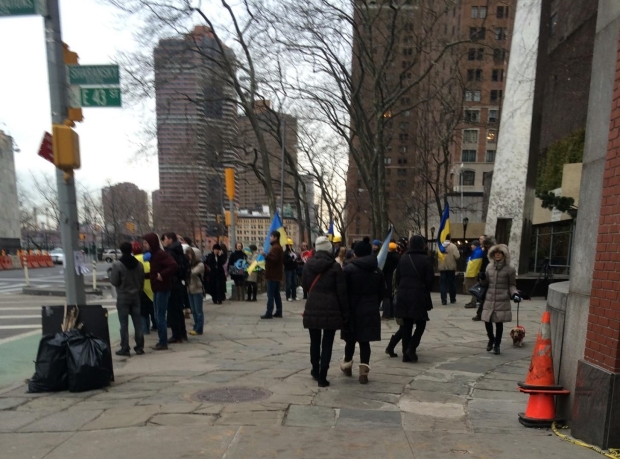
Ukrainian picketers at UN today. Photo by Hallie Shatravka
Amb. Sylvie Lucas of Luxembourg, who currently holds the monthly rotating presidency of the UN Security Council, spoke to reporters this evening after a a special session, saying members “stressed the need for an urgent de-escalation of the situation, and reiterated their call on all parties to exercise maximum restraint and to refrain from action and rhetoric which might exacerbate the situation.”
The Secretary General’s special envoy Robert Serry was dispatched to Ukraine earlier this week and was hoping to go to Crimea, but now after communication with the new authorities of the Autonomous Republic of Crimea, “concluded it was not possible,” and is now headed to Geneva.
Meanwhile, during the open part of the session, Russia’s permanent representative to the UN, Amb. Vitaly Churkin, called for a return to the 21 February agreement and the creation of a “government of national unity,” RIA Novosti reported. He had no comment for journalists after the session, said RIA Novosti.
In a telephone conversation with UN Secretary General Ban Ki-Moon, President Vladimir Putin said Russia would take “the necessary measures in the event of the continuation of violence against the Russian-language population in eastern Ukraine and in the Crimea, and also stated that it was necessary to prevent the escalation of the crisis in the country,” RIA Novosti reported.
The Federation Council has given the president of Russia its agreement for the use of the Armed Forces of the Russian Federation in Ukraine, but the Russian Foreign Ministry clarified that the consent of the Federation Council does not mean that this right will be rapidly implemented. Dmitry Peskov, press secretary for the Russian leader, announced that the question of the use of the Russian Armed Forces abroad is decided by the president, and no such decision has been made yet.
Several dozen people were injured in attacks by local Russian nationalists on EuroMaidan supporters in Kharkhiv today, including Serhiy Zadan, a famous Ukrainian writer.
0344 GMT:
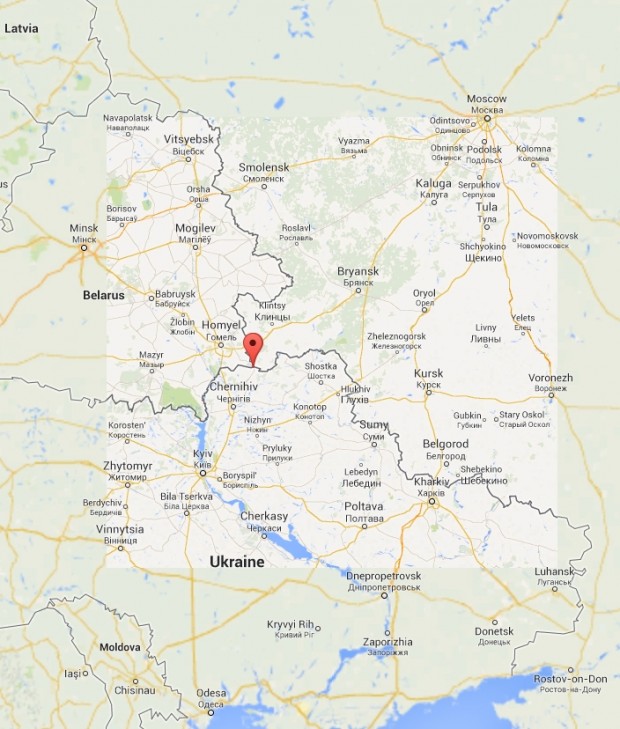
Google Maps
There are unconfirmed reports of a large mass of Russian troops and military vehicles on the border of Russia and Ukraine, according to a Kiev-based Russian-language publication supportive of the EuroMaidan protests.
Gordonua.com, a web news site maintained by the editor of Gordon Boulevard, says they have a report from a local resident that at the border post of Senkova in Chernihiv Region, there are a lot of Russian APCs and buses with soldiers concentrated on the Russian side of the border.
Russian military are telling reporters today that they are “on a Western Front training exercise” at this location, about 190 kilometers from Kiev where the Russian, Belarusian and Ukrainian borders come together. Earlier this week, 150,000 Russian troops were suddenly put on a combat readiness training. Russian Defense Minister Sergei Shoigu said the maneuvers were not related to events in Ukraine.
Meanwhile, Ukrainian border guards told Gordonua.com that they do not know what is going on, and they will act as they are ordered. “But they did let it be known that in the event of attack, they cannot withstand such a number of forces.”
Right Sector, the ultranationalist group supporting the EuroMaidan movement, is now disclaiming that its group leader Dmytro Jarosz ever made an appeal to Chechen insurgent Doku Umarov to help Ukraine’s freedom struggle, Radio Svoboda, the Ukrainian Service of Radio Free Europe/Radio Liberty reported today.
In an interview with Radio Svoboda, Artem Skoropadskiy, spokesman for Right Sector, said:
Our page was blocked for half an hour. One of the administrators of the group had his account hacked. Now that post is not there on our page.
According to Skoropadskiy, Right Sector’s position is “not to succumb to provocations or start them first, but we are ready to meet Russian occupation troops if they start fighting.” The group’s page did not appear to be blocked as we have been refreshing it regularly, but some readers report that it was not accessible for a time today. The appeal to Umarov is now indeed deleted, but another appeal in Russian “to the peoples of Russia” can still be seen:
Russians and other enslaved peoples of Russia! Now your fate is being decided in Ukraine. We have fought not only for our freedom, but yours! Now you also have a chance to fight for your freedom against the Chekist [KGB] regime of Putin.
Hold mass actions of protest! Create partisan divisions! Block the roads. Destroy the military infrastructure. Support us, and we will support you! There is NO other way!
Don’t believe the Putin Goebbels! We are not Russophobes. We are not agents of the USA. We are soldiers of freedom!”
Central Headquarters
Right Sector
10,372 people had “liked” it and 2,986 had re-posted it as of this hour. Meanwhile, Chechnya’s strongman leader Ramzan Kadyrov has not removed his threatening reply of six hours ago to what he believed was an appeal from Jarosz, and the Kremlin’s propaganda arm RT.com is continuing to make hay with the story without reporting the disclaimer.
0105 GMT: Canadian Prime Minister Harper has announced that Canada will recall its ambassador from Moscow and will not participate in the upcoming G8 conference because of developments in Ukraine.
The US will also not participate in the G8.
0040 GMT: The scrappy independent Crimean Tatar TV station ATR is still on the air, after a night of rolling “The Patriot” with Mel Gibson (on the American revolution) mixed with webcam footage of the armed men strolling up and down their parking lot outside. While the State TV station was taken over in Simferopol, and ATR has been gathering its personnel together and expecting the worse, they are still broadcasting. Perhaps the authorities need to keep at least some alternative sources of news open.
At 20:30 this evening, ATR carried a special broadcast on the issue of just what kind of troops have occupied their city. First, they ran footage from the State Department’s noon briefing quoting Jen Psaki reply to a reporter that the State Department had “no independent confirmation” of reports of Russian intervention in the Crimea. Then ATR aired scenes of the armed, uniformed men who seized the airport in Simferopol and are also guarding the parliament building (see some of the screenshots below). They asked independent war correspondent Andrei Babichenko in Moscow his opinion on what kind of forces they were seeing.
“In the photographs, you can see the VSS sniper’s rifles, the Vintorez, that’s the Russian Federal snipers’ rifles, with silencers. They are used by the special divisions. The uniforms are the standard uniforms for the motorized regiments, they can be motorized troops or airborne troops in such a uniform.”
Babichenko also referred to the report from Pskov reporter Lev Shlosberg, whom he further identified as a Yabloko [opposition party] deputy, who noted that the 76th Guards Air Assault Division of the Russian Airborne Troops in Pskov, were reported missing from their barracks and believed to have been dispatched to Ukraine. Shlosberg had further reported that “the officers and contact group have been sent on a trip somewhere.”
“We know where,” added Babichenko, indicating the Crimea.
We don’t know what footage Babichenko was looking at, but Censor.net.ua has posted many pictures of the forces headed towards Belbek. Note the rifle on the left in this first picture. A trusted expert we’ve consulted in Moscow suggests that this is a VSS Vintorez sniper riffle with a silencer:
Furthermore, our expert says that this weapon is not listed among the weapons of the Interior Ministry or Airforce of Ukraine, but they have been issued to spetsnaz (special assignment troops), special forces of the GRU. As these weapons are not part of the compliment given to the soldiers who are, under treaty with Ukraine, allowed to be in Crimea, their presence is a clear violation of this agreement.
These screen captures don’t show the rifles in question (we don’t think) but show more firepower packed by these soldiers:
Heavy firepower packed by soldiers in this picture:
Russian Dragunov makes an appearance in #Crimea. While technically not a sniper rifle, its 7.62x54R round is powerful pic.twitter.com/yIhcUSTPfY
— Thomas Gibbons-Neff (@Tmgneff) March 1, 2014
Another weapon seen in Crimea. This was taken in Simferopol last night:
Identifying weapons and the units they belong to may be a key part in figuring out which Russian units have been deployed to Crimea, knowledge that could perhaps open a clue into what the Russian government is planning to do next.
0031 GMT: A source who has requested anonymity writes from the small Crimean town of Sudak, about 57 km outside the city of Feodosiya, that the situation is tense but quiet:
“Everything seems to be quiet for now, but very tense. Near us the military base has been seized, Ukrainian soldiers are not resisting, because the advantage of forces is on Russia’s side by about 5 times. Crimeans realize that they have wound up as hostages of the situation. The civilian population is not being touched, the Russian [Federation] soldiers are concentrating on the airfields or the army bases.”
0024 GMT: US President Barack Obama and Russian President Vladimir Putin spoke for about 90 minutes tonight. The Guardian has posted a statement issued by the White House on that call, as well as a response from Putin’s office.
White House Statement:
President Obama spoke for 90 minutes this afternoon with President Putin of Russia about the situation in Ukraine. President Obama expressed his deep concern over Russia’s clear violation of Ukrainian sovereignty and territorial integrity, which is a breach of international law, including Russia’s obligations under the UN Charter, and of its 1997 military basing agreement with Ukraine, and which is inconsistent with the 1994 Budapest Memorandum and the Helsinki Final Act. The United States condemns Russia’s military intervention into Ukrainian territory.
The United States calls on Russia to de-escalate tensions by withdrawing its forces back to bases in Crimea and to refrain from any interference elsewhere in Ukraine. We have consistently said that we recognize Russia’s deep historic and cultural ties to Ukraine and the need to protect the rights of ethnic Russian and minority populations within Ukraine. The Ukrainian government has made clear its commitment to protect the rights of all Ukrainians and to abide by Ukraine’s international commitments, and we will continue to urge them to do so.
President Obama told President Putin that, if Russia has concerns about the treatment of ethnic Russian and minority populations in Ukraine, the appropriate way to address them is peacefully through direct engagement with the government of Ukraine and through the dispatch of international observers under the auspices of the United Nations Security Council or the Organization for Security and Cooperation in Europe (OSCE). As a member of both organizations, Russia would be able to participate. President Obama urged an immediate effort to initiate a dialogue between Russia and the Ukrainian government, with international facilitation, as appropriate. The United States is prepared to participate.
President Obama made clear that Russia’s continued violation of Ukraine’s sovereignty and territorial integrity would negatively impact Russia’s standing in the international community. In the coming hours and days, the United States will urgently consult with allies and partners in the UN Security Council, the North Atlantic Council, the Organization for Security and Cooperation in Europe, and with the signatories of the Budapest Memorandum. The United States will suspend upcoming participation in preparatory meetings for the G-8. Going forward, Russia’s continued violation of international law will lead to greater political and economic isolation.
The people of Ukraine have the right to determine their own future. President Obama has directed his Administration to continue working urgently with international partners to provide support for the Ukrainian government, including urgent technical and financial assistance. Going forward, we will continue consulting closely with allies and partners, the Ukrainian government and the International Monetary Fund, to provide the new government with significant assistance to secure financial stability, to support needed reforms, to allow Ukraine to conduct successful elections, and to support Ukraine as it pursues a democratic future.
Putin’s office:
In response to the concern shown by Obama about the plans for the possible use of Russia’s armed forces on the territory of Ukraine, Putin drew attention to the provocative, criminal actions by ultra-nationalists, in essence encouraged by the current authorities in Kiev,” the statement said.
The Russian President underlined that there are real threats to the life and health of Russian citizens and compatriots on Ukrainian territory. Vladimir Putin stressed that if violence spread further in the eastern regions of Ukraine and in Crimea, Russia reserves the right to protect its interests and those of Russian speakers living there.
These statements echo statements by the respective countries on the floor of the UN. So nothing has changed.
0018 GMT: Below is the complete statement from the US Ambassador to the UN, Samantha Power:
Thank you, Madam President. The United States renews our call for the international community to support the newly formed government of Ukraine and to prevent unnecessary violence. I would like to take a moment to respond to the comments made here by the representative of the Russian Federation. Actions speak louder than words. Early this morning, the Russian Duma acted to authorize the use of military force in Ukraine. This is as dangerous as it is destabilizing. We are deeply disturbed by reports this morning of Russian military intervention into Crimea. This intervention is without legal basis-indeed it violates Russia’s commitment to protect the sovereignty, territorial integrity, and independence of Ukraine. It is time for the Russian intervention in Ukraine to end.
The Russian military must stand down; the aspirations of the Ukrainian people must be respected; and political dialogue must be allowed to continue. We applaud the remarkable restraint and commitment to that dialogue that the new Ukrainian government in Kyiv has demonstrated in the face of hostility.
We have said from the outset that we recognize and respect Russia’s historical ties to Ukraine. But instead of engaging the government of Ukraine and international institutions about its concerns for ethnic Russians, Russia ignored both and has instead acted unilaterally and militarily.
It is ironic that the Russian Federation regularly goes out of its way in this Chamber to emphasize the sanctity of national borders and of sovereignty, but Russian actions in Ukraine are violating the sovereignty of Ukraine and pose a threat to peace and security.
Russia alleges various actions against and threats to minority groups in Ukraine. We see no evidence of these actions yet, but Russia’s provocative actions could easily push a tense situation beyond the breaking point. Russia’s incitement of groups to come out to protest is not responsible behavior in the present situation. There is a clear way forward that would preserve Ukraine’s sovereignty, territorial integrity, and address Russia’s concerns. First, Russia should directly engage the government of Ukraine. Second, international monitors and observers – including from UN and OSCE should be sent to Ukraine. That’s the best way to get the facts, monitor conduct, and prevent any abuses. Russia is a leading member of both institutions and can participate actively to ensure that its interests are upheld.The immediate deployment of international observers from either the OSCE or United Nations to Crimea would also provide transparency about the movement and activities of military and para-military forces in the region and defuse the tensions between different groups. We are also working to stand up an international mediation mission to the Crimea to begin to deescalate the situation, and facilitate productive and peaceful political dialogue among all Ukrainian parties.
Our paramount concerns are to end the confrontation and to find a solution that allows the Ukrainian people to determine their own destiny, their own government, their own future. That must be the goal of this Council and the international community.
The United States will work with Ukraine, our allies and partners in Europe and around the world, and here at the United Nations to uphold and protect the sovereignty, unity and democratic future of Ukraine.
Thank you.
0012 GMT: Alexey Korotaev, a Russian human rights monitor and past board member of Memorial Society, reports from Kharkiv, Ukraine where he observed clashes between pro-Moscow Russians and EuroMaidan supporters:
“Several dozen people approximately were injured in Kharkiv today (figures from 68 to 106 have been provided). Many have head and facial wounds (they were beaten by baseball bats). Serhiy Zhadan was also beaten over the head and had an open head wound (it was stitched in the hospital). Then he was dragged out on a stage that was set up right there on the square and they demanded that he kneel down and ask for forgiveness. He told them to screw off. After that, he was led away by policemen. Now he is ok and is talking on the Internet.”
2200 GMT: The UNSC meeting is now closed – A quick analysis — Russia has finally spelled out exactly what its given justification for invading Crimea is. According to their logic:
- The EU, the UK, and the US incited the protests and fueled the revolt.
- Yanukovych signed a deal with the opposition politicians that would keep him in power until, at least, early elections in December.
- The “armed militants” broke this agreement by taking over government buildings, therefore:
- Yanukovych is the legitimate leader of Ukraine and the people in charge are radicals,
- “Kiev,” the catchphrase for these radicals who are now running the country, is sending provocateurs to takeover government buildings in Crimea (interjection — there is literally no evidence that this is true). Therefore:
- The government of Crimea has asked Russia to send troops to restore order, and Russia has done so unilaterally because the West helped conspire to remove a democratically-elected government and put these radicals in charge.
- The bottom line: the international community needs to help remove the radicals and enforce the February 21st agreement (which, by the way, would require reinstating Yanukovych back as President).
- If this is not done, Russian troops will defend Crimea, and possibly attack Kiev to make it happen.
2149 GMT: France’s ambassador says that “we cannot ask Ukraine to choose either east or west,” and Russia’s move today is a threat to the territorial integrity of Ukraine that forces this choice.
2144 GMT: Now US Ambassador Samantha Power is speaking. Her demands are that Russia pull back from Ukraine, and international monitors are deployed to Crimea. Power wants to create an international mediation unit to end the crisis in Crimea.
The bottom line of Power, however, is that Russia has worked unilaterally, and this does not respect the sovereignty of Ukraine.
The UK Ambassador starts his talk with a shot at the Russian ambassador’s accusation that foreign powers created this crisis. He then says that Russia’s actions are “active aggression” against Ukrainian sovereignty.
2142 GMT: Now Churkin gets to his point — Ukraine needs to restore the agreement of the 21st of February, the radicals need to be sidelined, and the international community needs to make this happen.
2140 GMT: Now the Russian ambassador Vitaly Ivanovich Churkin gets to current events. According to him, people from Kiev are trying to overthrow the government in Crimea. Essentially, he says that armed pro-Kiev militants have tried to take over government buildings in Crimea, and Russia is assisting Crimea in restoring the peace.
2135 GMT: The UN Security Council meeting has started (watch it live here). The Ukrainian ambassador’s statements echoed what he said earlier. The Russian ambassador has said that Yanukovych had the legal right to pause the move towards the EU, and so there was no reason to protest, no reason for, as he characterizes it, the international community to interfere and stoke the opposition. The international community was responsible for the “armed militants” who took to the streets, threw molotovs at police, and toppled the government.
Then he gets to the agreement, signed the 21st of February, between the opposition leaders and Yanukovych. This is the roadmap that must be followed, and the opposition is the side that broke the agreement.
2115 GMT: One of the most iconic images of today, of the placing of a Russian flag on top of the city hall in Kharkiv, may have been staged not by ethnically-Russian or pro-Russian Ukrainians, but by Russians from Russia themselves. Furthermore, the claim is that a Russian-from-Russia neo-Nazi (there are many) is the one who put the flag up:
#Ukraine: Dear West, the truth about that #Russia flag in #Kharkiv: A #Russian #Nazi from #Moscow did it 😛 #crimea pic.twitter.com/QwRNdV0SC9
— East of Brussels (@EastOfBrussels) March 1, 2014
A related tweet establishes the twitter account for the man who says he placed the flag on the building, but the account is deleted.
Напоминаем, вот этот антифашист из Москвы @venomancer_ru ставил российский флаг на Харьковской ОДА сегодня. pic.twitter.com/LnnmFReZB2
— ЄВРОМАЙДАН (@euromaidan) March 1, 2014
We’ll see if we can confirm this report.
2108 GMT: In fodder for critics of the United Nations Security Council, the “emergency” meeting has yet to begun:
Inside UNSC meeting on #Ukraine, US, UK & France push for open meeting, #Russia wants it closed; procedural banter – diplomats tell @reuters
— louis charbonneau (@lou_reuters) March 1, 2014
The #UNSC meeting on #Ukraine scheduled for 2pm still hasn't started. They've been arguing for hour and half about the format of the meeting
— Marcelle Hopkins (@marcellehopkins) March 1, 2014
Though it seems there has been a breakthrough – and it seems Russia lost:
In 10 mins RT @lou_reuters UKAmbassador @LyallGrant says there will be a public UN Security Council meeting at 16:15 EST on #Ukraine crisis
— Myroslava Petsa (@myroslavapetsa) March 1, 2014
2057 GMT: US Secretary of Defense Chuck Hagel spoke earlier with Russian Minister of Defence Sergei Shoigu.
Asked about rumours that some US military units had been on alert over turmoil in the Crimean peninsula, the official said the US focus was on diplomatic options. There was no change in the US military’s stance, said the official, who spoke on condition of anonymity.
Nothing to see here. Move along.
2038 GMT: An update on the statement by Right Sector leader Dmytro Jarosz who has called on Chechen militant Doku Umarov to help Ukraine (see update 2015).
Not surprisingly, Chechnya’s ruler Ramzan Kadyrov, who has been reportedly included in the US government’s classified section of the Magnitsky List of sanctions for gross human rights violations, has responded to the call from Ukrainian Right Sector’s appeal to Chechen insurgent leader Doku Umarov. Here is a translation of Kadyrov’s statement on his favorite medium for communication, Instagram 45 minutes ago — which sounds like he has taken out a contract on Jarosz:
“Today it has become known that the leader of the Ukrainian nationalists from the Right Sector Dmytro Jarosz is asking Doku Umarov to organize terrorist attacks in Russia. We have obviously seen whom America and Europe considers an opposition member and a political force. Yarosh publicly calls for terror, but he is being helped by countries that are supposedly against terror. The USA declared Umarov one of the main terrorists of modern times, but Yarosh for them is a good guy. Ukrainian nationalists would like to oppose Russia, as well as the Crimean Tatars. I personally have spoken to their leaders. They are not intending to take up arms against Russia. But we will not leave without attention Dmytro Jarosz’s words that he has fought in Chechnya. Doku Umarov, with our help, has been sent to a place from which no one has ever returned. We will write a ticket there for Yarosh, too.”
As can be seen below in our translation of Jarosz’s statement, Jarosz didn’t call for terrorist attacks within Russia, and only implied Chechen rebels should come to Ukraine to fight. But he did say Ukrainian rebels have helped the Chechen struggle in the past, and “now is the time to support Ukraine” — and for the Chechens to “activate” their own struggle.
Doku Umarov, leader of the Islamist Caucasus Emirate, has been repeatedly reported has killed by Chechen security forces, but is reportedly still alive.
The Crimean Tatar leadership in Crimea under the Medjlis (Assembly) has mainly supported the EuroMaidan movement and the new Ukrainian government in Kiev, but one pro-Moscow faction leader of the Crimean Tatars who was in deposed Yanukovych’s religious council has been repeatedly invoked by the Kremlin in its propaganda efforts around the conflict in Crimea.
In related news:
Quite amazing that Right Sector has been using a Russian social network rather than Facebook. Anyway, they've been thrown out of VK.
— Leonid Ragozin (@leonidragozin) March 1, 2014
A closer analysis — it seems that the group is still on VK, but the post has been removed.
2032 GMT: A VERY important claim, if it is confirmed. Reuters reports:
Two Russian anti-submarine warships have appeared off the coast of Ukraine’s Crimea region, violating an agreement on Moscow’s lease of a naval base, Interfax news agency quoted a Ukrainian military source as saying.
The source said the two vessels, part of Russia’s Baltic Fleet, had been sighted in a bay at Sevastopol, where Moscow’s Black Sea Fleet has a base.
2030 GMT: We’ve been following reports that pro-EU protesters were beaten by pro-Russian crowds today in Kharkiv. One of the men who was injured is a prominent member of Ukrainian intelligentsia.
Serhiy Zhadan, the best Ukrainian writer beaten today by supporters of Russia in Kharkiv #ukraine pic.twitter.com/TLD3RaS25d
— Nataliya Gumenyuk (@ngumenyuk) March 1, 2014
2021 GMT: Ukrainian Ambassador Sergeyev, speaking to journalists at the stake-out near the UN Security Council, believes there is still time to stop Putin’s invasion of Ukraine. The UNSC has been in an emergency closed session on Ukraine since 2:00 pm EST. InnerCity Press has the story.
2015 GMT: Moscow is howling now in all the state news outlets about the statement from Dmytro Jarosz, leader of the Ukrainian Maidan defense group “Right Sector,” who has made an appeal for help from Chechen insurgent leader Doku Umarov, who is included on the US list of foreign terrorists.
We checked and indeed found, on the VKontakte page for the group Right Sector, the following statement in Russian posted two hours ago, which we translate below:
Appeal from the leader of the Right Sector Dmytro Jarosz to Doku Umarov
The Ukrainian people and the peoples of the Caucasus are united by their joint shedding of blood. Many Ukrainians with weapons in their arms have supported the liberation struggle of the Chechen and other Caucasian peoples. Now is the time to support Ukraine!
As leader of the Right Sector, I call on you to activate your struggle. Russia is not so strong as it seems. You have a unique chance to win. Use that chance!
The statement garnered 11,427 “likes” as of this hour and 3,495 re-posts. While not exactly a direct call on Chechen insurgents to come help fight the war for Ukraine, it is inflammatory enough.
2010 GMT: The BBC has posted ugly footage from Kharkiv of pro-Russian protesters beating two Euromaidan protesters and forcing them to kneel. Protesters then climbed City Hall and placed a Russian flag on the top of the building.
2005 GMT: Russia is not happy with the new acting defense minister of Ukraine, Igor Tenyukh, a 56-year-old admiral from Lvov who is in the Svoboda Party. Stanislav Byshok, an expert at the CIS Election Monitoring Organization, which usually takes pro-Moscow positions, comments for RIA Novosti:
“The situation in the Crimea is such that the appearance there of a representative of the Svoboda Party, Tenyuk, appointed by the new government as the head of the Defense Ministry, will hardly foster the reduction of political tension and normalization of the situation on the peninsula. The very appointment of Igor Tenyukh, who is considered a representative of the “party of war” as defense minister, cannot indicate any peace-loving nature in the new Ukrainian government.”
2001 GMT: Ukrainian Defense Minister Tenyukh has refuted the information that Russian Federation troops are in Zaporozhe, but the Ukrainian army is on full alert.
Министр обороны Тенюх опроверг информацию о перемещении российских войск в Запорожской области.
— saken aymurzaev (@sakenaim) March 1, 2014
via @ukrpravda_news Ukrainian Armed Forces are in full alert,decision of Council of national security and defense, #CrimeaInvasion
— Kateryna_Kruk (@Kateryna_Kruk) March 1, 2014
2000 GMT: A potentially significant escalation:
Ukraine is ready to mobilize its armed forces to protect its strategic locations, acting president says. http://t.co/kLqZBfnA63
— CNN Breaking News (@cnnbrk) March 1, 2014
1959 GMT: More Russian troops are reportedly being deployed in Crimea:
Ukraine spokesman at UN says 15000 Russian troops have entered #Crimea, adding to Russian forces already there. #Ukraine #un
— Nick Bryant (@NickBryantNY) March 1, 2014
And we’re waiting for additional statements from the interim government:
At Ukraine's Foreign Affairs Ministry, waiting for an emergency late-night briefing pic.twitter.com/pHo51AneHZ
— Maxim Eristavi (@MaximEristavi) March 1, 2014
1950 GMT: Ukraine’s Ukrainian Ambassador Sergeyev has just spoken on the UN webcast. He said that the Russian military actions were unacceptable, and Ukraine’s military was on highest alert. But he also said that, at least “for now,” the new government is not planning on cancelling its treaty that allows the Russian military to station the Black Sea fleet in Crimea.
This is important because such a move would surely be seen by the Russians as a provocation from what it sees as an illegitimate government. But at the exact same time, it is the Black Sea fleet’s bases that Russia is using to install troops in the Crimea.
In other news, sources say that the reports of Russian forces moving into Zaporizhya have been refuted by the Ukrainian defense ministry. For now, all we know about Russian forces in Ukraine is that they are in Crimea. All other reports are unconfirmed, and we have decreasing confidence that they are accurate.
1936 GMT: The Svoboda party, the right-wing nationalist party, has made new provocative statements against Russian intervention. John Schindler reports:
BREAKING: "This is war!"-Svoboda calls for mass mobilization to defend #Ukraine from "KGB maniac Putin," compares him to Hitler – Interfax
— John Schindler (@20committee) March 1, 2014
Svoboda calls for martial law: "We will not cede a single plot of Ukrainian land to the invaders. We shall win! Glory to Ukraine!"
— John Schindler (@20committee) March 1, 2014
1925 GMT: Interfax Ukraine reports that the resolution of Russia’s Federation Council giving the agreement for the Russian president to use Russia’s armed forces on the territory of Ukraine was taken on the basis of unconfirmed information, says Andrei Yurov, a prominent expert of the veteran Moscow Helsinki Group who is also a member of the Presidential Council on Human Rights:
“I have just read the statement today from Mrs. Matvienko, chairwoman of the Russian Federation Council of the Federation which says that there were casualties among Russians in the Crimea. That was the basis for today’s vote. I was finally able 10 minutes ago to reach Vyacheslav Svetlichny, the Consul General of Russia, to clarify the situation with him as to whether there really were casualties among Russians. He stated that there were no casualties among Russians, and the night-time clash about which the Supreme Council of the Crimea writes consisted only of a few shots in the air. That is, this was some small resistance with force within the Interior Ministry, but we cannot speak of any casualties, or any real large-scale events.”
Yurov added, “I believe that law-enforcers have the situation completely under control, and there is no need for external forces at all.”
1918 GMT: While we’re still looking at unconfirmed reports that Russian forces have moved into mainland Ukraine, let’s take a look at what’s happened inside Crimea today. First, there have been crackdowns on journalists:
Russian army seized the office of the Crimean Center for Investigative Journalism http://t.co/3Sjs9qVOMZ #Ukraine #Crimea #CrimeaInvasion
— Federico Pignalberi (@fpigna) March 1, 2014
And Russian military soldiers reportedly once again moved in on Ukrainian border posts:
How Citizens from #Balaklava stood today as living shield between armed #Russian military&border guards – theinsider pic.twitter.com/HnZGhhLvSx
— Euromaidan PR (@EuromaidanPR) March 1, 2014
1913 GMT: NATO article 4 has only been invoked 4 other times, and it means that the NATO nations will have to hold an emergency council to discuss a developing crisis:
Lithuania and Latvia have both called for NATO article four consultations after the Russian attack on Crimea.
— Ben Judah (@b_judah) March 1, 2014
1908 GMT: Just a few moments ago we carried an unconfirmed report that Russian troops had crossed the Chonchar peninsula into Zaporizhya, mainland Ukraine. Here’s more evidence, though this story is still far from confirmed:
A column #Russian troops is moving through the territory of #Zaporizhzhya region http://t.co/fQdYx9E3xb |PR #Ukraine pic.twitter.com/QGKa4pY1HB
— Euromaidan PR (@EuromaidanPR) March 1, 2014
1903 GMT: Censor.net reports, citing the Herson News that civilians in camouflage with the St. George ribbons used by Russian nationalists have blocked off the entrance of the Crimea. Reportedly armed Berkut soldiers are also on the scene. Reporters say they were barred from the area.
Hromadske TV reporter Bohdan Kutepov and other reporters say they are not being allowed in the Crimean peninsula:
“They took away flash cards and cameras from journalists at Inter! They jerked the shutters and told us to get the [expletive] out; they shouted “you shit on Kiev!” at the border between Crimea and Ukraine…Not a single journalist is getting through, not CDF, France24, Inter.”
1900 GMT: Russian activists have started a petition under the old banner “For Our Freedom and Yours” against interference in Ukraine which has already gathered thousands of signatures. They have also made a Facebook group that has already attracted more than 13,000 likes in the last few hours.
We, citizens of Russia who have signed below, declare our complete disagreement with the policy which the leadership of our country is conducting regarding the Crimea without any coherent explanations. This policy consists of offering a platform to the deposed president Yanukovych; whipping up rumors of non-existent “bands” and persecution supposedly threatening the Russian population of the Crimea, and finally, landing troops on the territory of Ukraine in any, even a numerically small military contingent. This in no way corresponds with the stated goal of supporting peace in Ukraine.
1855 GMT: There is an unconfirmed report that Russian troops have crossed into Zaporozhe. Watch this space.
BIG (if true): reports that Russian troops have crossed Chonchar peninsula into Zaporizhya ie mainland #Ukraine http://t.co/C9d0PZnb4c
— John Schindler (@20committee) March 1, 2014
1852 GMT: 5 Channel is reporting the shooting in Simferopol. This video appears to show the aftermath, but not the gunfire itself:
There will be more, sadly / RT @myroslavapetsa: Shooting in #Simferopol – video via @5channel http://t.co/OmZ8IYCXxt
— John Schindler (@20committee) March 1, 2014
1848 GMT: Breaking but unconfirmed…
BREAKING NEWS: Shooting has started at the central streets of Simferopol, Crimea
— ЄВРОМАЙДАН (@euromaidan) March 1, 2014
1835 GMT: US Ambassador to the UN, Samantha Power, has released this statement (excerpted below):
We are gravely disturbed by reports of Russian military deployments into the Crimea. The United States calls upon Russia to pull back the military forces that are being built up in the region, to stand down, and to allow the Ukrainian people the opportunity to pursue their own government, create their own destiny and to do so freely without intimidation or fear. We call upon all states to respect the sovereignty of Ukraine. As various political actors begin making decisions about what role they will play in shaping that future, the international community has an opportunity and a responsibility to stand firmly with the people of Ukraine and, in doing so, to prevent unnecessary violence. Given the present turbulence, it is useful for the Council to reiterate certain principles, including the unity and territorial integrity of Ukraine, the need for peaceful dialogue and the prevention of further violence, and the fact that Ukraine’s future can only be determined by the Ukrainian people.
The United States stands with the Ukrainian people at this remarkable moment and welcomes the formation of the new government; we are pleased that the cabinet is both inclusive and representative and we congratulate the members of the Rada and the Ukrainian people on their historic achievement.
Interestingly, though there’s no evidence that minority rights have been particularly threatened, especially since several prominent Jewish leaders have called those allegations more provocation than reality, Power seems to reference them:
The new government needs to continue its outreach to minority groups in order to help calm the situation and affirm its commitment to protecting minority rights. Clearly this is a message that needs especially to be heard in the Crimea, where we have seen actions and heard rhetoric that could threaten Ukraine’s unity and stability. To underline this point, let me be clear that the United States would condemn any move to undermine Ukraine’s sovereignty or territorial integrity, which we expect all states to respect. The best way for the people of Crimea to achieve their goals is to work peacefully within the established political system. To this end, the United States calls for an urgent international mediation mission to the Crimea to begin to deescalate the situation, and facilitate productive and peaceful political dialogue among all Ukrainian parties.
We encourage all Ukrainians to pursue their aspirations through peaceful dialogue and nonviolent political activity in combination [with] the new government’s efforts – with appropriate international assistance — to bring about economic recovery and renewed hope for the future.
Interestingly, this statement clashes very squarely with an analysis by Timothy Snyder in The New York Review of Books. Snyder investigates the roots of the Ukrainian revolution and discovers that they were started by a man named Mustafa Nayem, a Afghan and a Muslim. Hey also points out that Russian propaganda has created the mythology around the Maidan protests, first dubbing them “Gayeuromaidan” and then ultimately insinuating that they were anti-Russian pro-Nazi rallies.
Whatever course the Russian intervention may take, it is not an attempt to stop a fascist coup, since nothing of the kind has taken place. What has taken place is a popular revolution, with all of the messiness, confusion, and opposition that entails. The young leaders of the Maidan, some of them radical leftists, have risked their lives to oppose a regime that represented, at an extreme, the inequalities that we criticize at home. They have an experience of revolution that we do not. Part of that experience, unfortunately, is that Westerners are provincial, gullible, and reactionary.
Thus far the new Ukrainian authorities have reacted with remarkable calm. It is entirely possible that a Russian attack on Ukraine will provoke a strong nationalist reaction: indeed, it would be rather surprising if it did not, since invasions have a way of bringing out the worst in people. If this is what does happen, we should see events for what they are: an entirely unprovoked attack by one nation upon the sovereign territory of another.
Insofar as we have accepted the presentation of the revolution as a fascist coup, we have delayed policies that might have stopped the killing earlier, and helped prepare the way for war. Insofar as we wish for peace and democracy, we are going to have to begin by getting the story right.
So Power is echoing misinformation from the Russian camp. Perhaps this is a call for calm, to let the Crimeans know that the United states respects their rights and is worried about their fate. Or perhaps it’s just an early indication that the US is afraid to act on this crisis out of fear that they’ll be associated with a revolution that Moscow calls a Nazi resurgence in Europe. Regardless, it’s propagating a myth that originated not in the streets of Ukraine but in the pages of the Kremlin’s playbook.
1825 GMT: A key feature of events throughout the past days has been repeated denials from the Kremlin and its supporters that it has sent troops from Russia, along with claims that armed masked men are either contractors merely securing sites or local pro-Russian militias. Well, here they are: the Russian troops from Russia, as the photo indicates in a tweet from the BBC’s Daniel Sandford from Balaclava:
Balaclava now. The entrance to the coast guard base pic.twitter.com/s2p6v157m5
— Daniel Sandford (@BBCDanielS) March 1, 2014
1728 GMT: Right Sector is a hardline right-wing group that is part of the Euromaidan movement in Ukraine…
On its website, Right Sector announced "full mobilization" in coordination with #Ukraine MoD, SBU & IntMin. That ought to calm things down.
— John Schindler (@20committee) March 1, 2014
1708 GMT: Ukraine vs. Russia – what does that even look like? We’ve been sent this helpful chart, made by @MrHalimi, that breaks down some key data points (data sources):
1658 GMT: The UN Security Council will hold an emergency meeting to address this crisis.
1644 GMT: Keep in mind that the source for this story is RT, and we haven’t confirmed all these locations, and we’re not sure what “raising a Russian flag” means, but clearly pro-Russian militias and protesters have taken to the streets in many Ukrainian towns and cities today:
#Russian flags raised in the #Ukrainian cities of Melitopol, Yevpatoria and Mariupol http://t.co/xchF0cwlsW pic.twitter.com/Xq5T9q4auV –@RT_com
— Euromaidan PR (@EuromaidanPR) March 1, 2014
1641 GMT: So even though Russia has already technically invaded Ukraine, this is probably a reference to a much large military action.
Peskov says no date set for Russian invasion of Ukraine yet. All decisions up to Putin, silent on Ukraine for weeks http://t.co/AAzqcWxhDM
— max seddon (@maxseddon) March 1, 2014
1630 GMT: The Russian government has reportedly been making moves to nationalize Yanukovych’s infamous Berkut riot police — a story we’ve been covering all week. Now, this might be the first confirmation that it’s actually happening:
Photo purportedly shows #Ukraine Interior Ministry riot control troops being given Russian passports. pic.twitter.com/0b9ID8c4kF
— Christopher Miller (@ChristopherJM) March 1, 2014
Again, this looks to be part of a plan to take over Ukraine from the inside, using not only Russian bases and troops that are already there, but Ukrainian militias, paramilitary groups, former police, and armed thugs
1625 GMT: Earlier we reported an unusual rally in Donetsk, where pro-Russian protesters held a rally but then quickly dissolved as soon as it was done (jump to update 1504). Here’s a picture from earlier in the day:
Pro-#Russia protesters in the eastern #Ukraine city of Donetsk. pic.twitter.com/Omr7BNadP0 via @sputnikipogrom
— Jim Roberts (@nycjim) March 1, 2014
1603 GMT: Russia might be the fiercest military force in Ukraine, but it’s not the only force that’s fighting right now. Clashes have erupted as pro-Euro protesters were attacked by pro-Russian crows in Kharkiv today:
Pro-Russian group storms #Kharkiv administration building earlier today, clashing with pro-European crowd. http://t.co/QqLt4Mu3bn
— Christopher Miller (@ChristopherJM) March 1, 2014
In pro-Russian Kharkiv today, activists for the revolution are beaten and forced to kneel: pic.twitter.com/onto628G1e via @HromadskeTV #Ukraine
— Simon Shuster (@shustry) March 1, 2014
1559 GMT: With Ukraine’s military largely on the sidelines since this crisis started 12 days ago, and with their loyalty to the interim government in question, now they may be put to the ultimate test:
Senior Ukrainian politician Vitali Klitschko calls for 'general mobilization' in Ukraine – @Reuters
— Breaking News (@BreakingNews) March 1, 2014
1550 GMT: Unanimous — after debates that sounded like a return to the Cold War, the Russian State Duma voted unanimously to intervene militarily in Ukraine.
Russia's senate votes unanimously for #Putin's #Ukraine invasion. pic.twitter.com/vWGEK03ZgJ @maxseddon
— Maks Czuperski (@MaksCzuperski) March 1, 2014
1518 GMT: Now some international condemnation, this from Sweden’s Foreign Minister:
Russian military intervention in Ukraine is clearly against international law and principles of European security. http://t.co/Oby0UXmROs
— Carl Bildt (@carlbildt) March 1, 2014
Unfortunately for Sweden, they don’t seem to have enough tanks for Russia to care what they think.
Half the discussion at Russia's Federation Council is about the U.S. Are we being invaded next? #Ukraine
— Julia Ioffe (@juliaioffe) March 1, 2014
1510 GMT: Still in doubt as to the intentions of the Russian government? Still think that Russia is only deploying troops to Ukraine to stabilize the situation? Then you’re obviously not listening to the Russian State Duma, which has just authorized Russian military action in Ukraine.
"@juliaioffe: One Russian parliamentarian says: "We've been waiting for this request from Vladimir Putin for a long time.""
— Ali Hashem علي هاشم (@alihashem_tv) March 1, 2014
Members of Russia’s Duma, or parliament, are clear that European and American imperialism is a real and present danger to both Ukraine and Russia, that joining the EU would be an economic and humanitarian disaster for Ukraine, that Russia needs to return a democratically elected leader to power in Ukraine, and that if they do not act quickly then the Western imperialists will topple most of Europe:
Deputy FedCom speaker Yuri Vorobyov: "We know that Maidan fighters active in Kiev and elsewhere were trained in Lithuania and Poland"
— max seddon (@maxseddon) March 1, 2014
Russian parliamentarian Vorobiev calls for recalling Russian ambassador to US.
— Julia Ioffe (@juliaioffe) March 1, 2014
Vorobiov says words of @BarackObama concerning Russian invasion is a direct threat to Russian people.
— Christopher Miller (@ChristopherJM) March 1, 2014
The current "debate" in #Russia's upper house now follows the finest of Soviet traditions. Almost speechless.
— Dan Peleschuk (@dpeleschuk) March 1, 2014
1504 GMT: ABC News reports that pro-Russian protests have broken out across several major cities in Ukraine. This is accurate, and of course there are many pro-Russian people in Ukraine, particularly in the east.
Today's pro-Russia demo in Mariupol (big eastern city). Ppl took down Ukr flag on local govt building – @novostidnua
pic.twitter.com/EftaY6jzGy
— Maxim Eristavi (@MaximEristavi) March 1, 2014
However, there are some interesting observations about some of the protests, especially outside of Crimea:
Pro-Russia demo in Donetsk has ended suddenly, local reporters suggest because it was "pre-paid"
via @olgatokariuk
pic.twitter.com/q1xLmbbfnb
— Maxim Eristavi (@MaximEristavi) March 1, 2014
This is a possibility, not just an opposition conspiracy theory. Russia has been known to pay crowds of protesters before, and since November some anti-EU protesters have been documented as only showing up because they were paid to be there.
1458 GMT: We need to stress this as much as we can — this is not about stabilizing Crimea. Analysis of what the Kremlin is doing provides significant evidence that Russia is attempting to annex Crimea, perhaps all of eastern Ukraine, or perhaps the entire country.
Take, for instance, a new bill in the works in the State Duma that would make it easier for Russia to absorb part of another country. The Moscow Times reports:
“The initiative is ready and will be submitted today,” A Just Russia member Mikhail Yemelyanov said, Interfax reported. “Since this is a national issue, all representatives from all factions are free to sign on to the bill.”
The bill will amend a law passed in 2001 that stipulates that a “new entity” can join Russia by signing a treaty with the state that it belongs to.
Yemelyanov also said that a bill making it easier for Ukrainians to become Russian citizens will be introduced for the Duma’s consideration on Friday.
Under the proposed legislation, Ukrainians would only be required to know Russian language to get a Russian passport.
1449 GMT: The takeover of Crimea is already underway:
Russia has officially decided to send troops to #Ukraine but they've already been on Crimea territory for well over a day
— Paul Sonne (@PaulSonne) March 1, 2014
Balaclava now. The entrance to the coast guard base pic.twitter.com/s2p6v157m5
— Daniel Sandford (@BBCDanielS) March 1, 2014
These next few updates are from earlier this morning:
Pro-Russia protesters are storming Donetsk govt building, have taken down Ukraine flag from it – @novostidnua
— Maxim Eristavi (@MaximEristavi) March 1, 2014
Armed men in green fatigues and masks now standing outside the parliament in Simferopol. Clearly professionals. pic.twitter.com/QLqSdt2S45
— Paul Sonne (@PaulSonne) March 1, 2014
1446 GMT: The vote to authorize the sending of Russian troops to Ukraine has passed:
Unanimous vote in #Russia's Federation Council to send Russian troops to #Ukraine.
— Christopher Miller (@ChristopherJM) March 1, 2014
1440 GMT: RIA Novosti, the Russian news agency that was recently reorganized for increased Kremlin control, gives us a good sense of how this is being portrayed by the Russian government and the Russian press.
The leaders of Russia’s upper and lower houses of parliament called Saturday on President Vladimir Putin to stabilize the situation in Crimea and protect Russian citizens.
The leader of Federation Council, Russia’s upper house, said the use of military force in the former Soviet nation could be justified after the opposition swept into power in Kiev last weekend.
“In this situation it would even be possible, on the request of the Crimean government, to bring in a limited contingent [of troops] to guarantee security,” Valentina Matviyenko said.
The partition of Ukraine has become increasingly likely in recent days as heavily armed men understood to be Russian soldiers have taken control of key facilities and blocked roads in Crimea.
About 60 percent of the residents of Ukraine’s southern peninsula are ethnic Russians with the remainder of the population made up of Ukrainians and Crimean Tatars, who largely support the incoming regime.
The State Duma, Russia’s lower house, released a similar statement Saturday that said must Putin bring the situation in Ukraine under control.
“All available means” should be deployed to protect Russian citizens, said Sergei Naryshkin, a former head of the presidential administration and the current parliamentery speaker in the Duma.
The report goes on to talk about pro-Russian protests in Crimea.
In other words, on one hand the argument is that this is not an invasion but a security force, while on the other hand the argument is being advanced that it’s OK for Russia to invade because many people are pro-Russian or are Russian citizens.
1432 GMT: Some analysis from a Russian expert:
Putin's statement actually says Russia will avail itself of the right to send troops to ALL of Ukraine: http://t.co/miteKMWCpT
— max seddon (@maxseddon) March 1, 2014
This deal has already been approved by the Russian State Duma:
Breaking from @AFP: #Putin asks #Russia's upper house of parliament for approval to use armed forces in #Ukraine.
— Christopher Miller (@ChristopherJM) March 1, 2014
1415 GMT: Yesterday you could call what happened in Ukraine a soft invasion. Russian troops are already stationed in Crimea, but are not allowed to operate on the streets of Ukraine without permission from the government of Ukraine. And yet troops from Russia’s bases took over a border crossing and a coast guard station, and more troops landed in Russia’s naval bases, raising concern that a formal invasion would take place. More concerning were the capture of Crimea’s two airports by heavily-armed men who appeared to be Russian soldiers, and the reports that thousands of Russian soldiers were landing at those airports.
Today, Russia is making preparations for a formal invasion of Ukraine. He made this statement to the Council of the Federal Assembly of the Russian Federation, translated below:
“In connection with the extraordinary situation that has arisen in the Ukraine, the threat to the lives of citizens of the Russian Federation, our fellow countrymen and the personnel of the military contingent of the Armed Forces of the Russian Federation deployed on the territory of the Ukraine (the Autonomous Republic of the Crimea) in accordance with an international agreement, on the basis of Point G Part 1 of Article 101 of the Constitution of the Russian Federation [governing the use of Russian armed forces outside Russian territory], I am submitting to the Council of the Federation [upper house] of the Federal Assembly of the Russian Federation a request to use the Armed Forces of the Russian Federation on the territory of the Ukraine until the normalisation of the socio-political situation in that country.”
Call this whatever he wants to — this is war.
AlJazeera America also reports that this is already underway, and that 30 APCs and 6000 troops have already been sent to Crimea “for security reasons.”
The Russian troop presence in Crimea could not be immediately confirmed, but the head of Russia’s upper house of parliament said it would be possible for the country to send a limited number of troops to Crimea for security reasons.
Ukrainian Defense Minister Igor Tenyukh on Saturday told the Ukrainian government’s first cabinet session that Russia has sent 30 armored personnel carriers and “recently” sent 6,000 additional troops into Crimea in a bid to help local pro-Kremlin militia gain broader independence from the new pro-European Union leaders in Kiev.
Several military transport planes and about 10 military helicopters had entered Ukrainian airspace on Friday without permission, he said.
